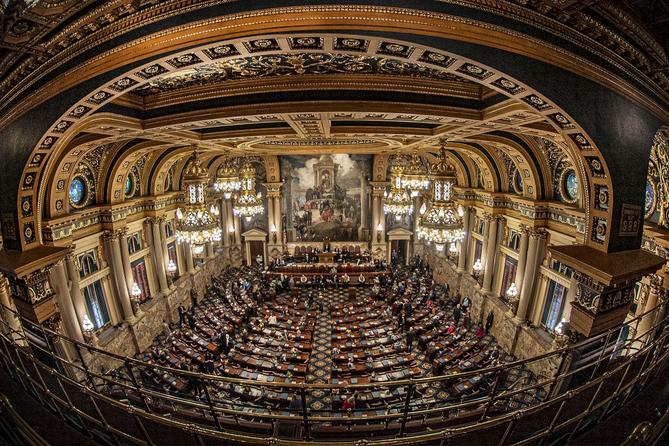Spotlight PA is an independent, nonpartisan newsroom powered by The Philadelphia Inquirer in partnership with PennLive/The Patriot-News, TribLIVE/Pittsburgh Tribune-Review, and WITF Public Media. Sign up for our free newsletters.
HARRISBURG — In 2019, The Caucus and Spotlight PA began filing requests for every legislative expense lawmakers covered with taxpayer money, salaries and benefits not included.
The purpose? To find out how one of the largest and most expensive full-time legislatures in the country spends tax money on itself.
Here are five takeaways from a year spent pulling back the curtain.
Millions of dollars expensed annually
The General Assembly spent $203 million from 2017 through 2020 just to feed, house, transport, and provide rental offices and other perks for lawmakers and their staffs.
$20 million of that went into lawmakers’ pockets in the form of reimbursements for meals, mileage subsidies, per diems, and other expenses.
That’s on top of salaries that are already among the highest of any legislature in the nation, dinners on the dime of lobbyists and industry groups, and access to campaign war chests that some have used for everything from a new pair of sneakers to a jaunt through Europe.
Read more: Inside the year-long fight to figure out how the Pa. legislature spends taxpayer money on itself
Documents are hard to come by (and harder to parse)
Citizens who want to see what lawmakers are buying with their money face an array of barriers and even pushback from lawyers hired with, you guessed it, taxpayer money.
When the records finally do arrive, they’re in PDF files that can run more than 1,000 pages, some of which aren’t text-searchable. Redactions are also routine.
Read more: Taxpayers foot huge bill to run Pa.’s full-time legislature, but are blocked from many details
Transparency in name only
More than a decade after some members first started posting their own expenses online, just 18 lawmakers in the 203-member House and 11 in the 50-member Senate post some level of financial information today.
While several leaders said they would “consider” requiring the legislature’s expenses be posted online by individual members, only one — Senate President Pro Tempore Jake Corman (R., Centre) — said he will champion the change.
Meanwhile, Corman’s own voluntary online expense reports are more than six years out of date.
Corman, in an interview, did not explain why his website had become so outdated but said he is working with Senate officials to make expenses more easily available online.
“We are trying to update that so that it’s much more readily available to be seen,” he said. (Update: Since the original story was published, a Corman spokesperson reached out to say the website has been updated to ensure all expenses are current.)
Read more: Some Pa. lawmakers tout expense transparency. Their websites tell a different story.
And the biggest spender is …
Rep. Chris Sainato (D., Lawrence) collected about $235,000 in per diems and reimbursement for other expenses over the four years examined.
That works out to about $59,000 a year, $5,000 more than the median annual household income in the county he represents.
Sainato did not respond to calls and emails from reporters.
Read more: See the Pa. lawmakers who spent the most on food, lodging, mileage and more
Vague disclosures hide detail
Even unredacted records don’t tell the full story, as lawmakers and staff sometimes use vague descriptions to explain their purchases.
For example, a House Democratic Caucus expense to reimburse a staffer had no description in the reports originally provided, and in a separate request had the memo, “To enable access to work email while away from office.”
The actual receipt of the transaction, acquired through a follow-up request, revealed a Royal Caribbean cruise receipt for a “zoom surf + stream voyage package,” otherwise known on their website as “the fastest internet at sea.”
Lawmakers’ statements of financial interest filed with the State Ethics Commission can be similarly opaque. They need only disclose gifts worth $250 or more, and transportation and hospitality worth $650 or more.
Read more: Lawmakers report receiving fewer gifts during pandemic as push for ban continues
WHILE YOU’RE HERE… If you learned something from this story, pay it forward and become a member of Spotlight PA so someone else can in the future at spotlightpa.org/donate. Spotlight PA is funded by foundations and readers like you who are committed to accountability journalism that gets results.

